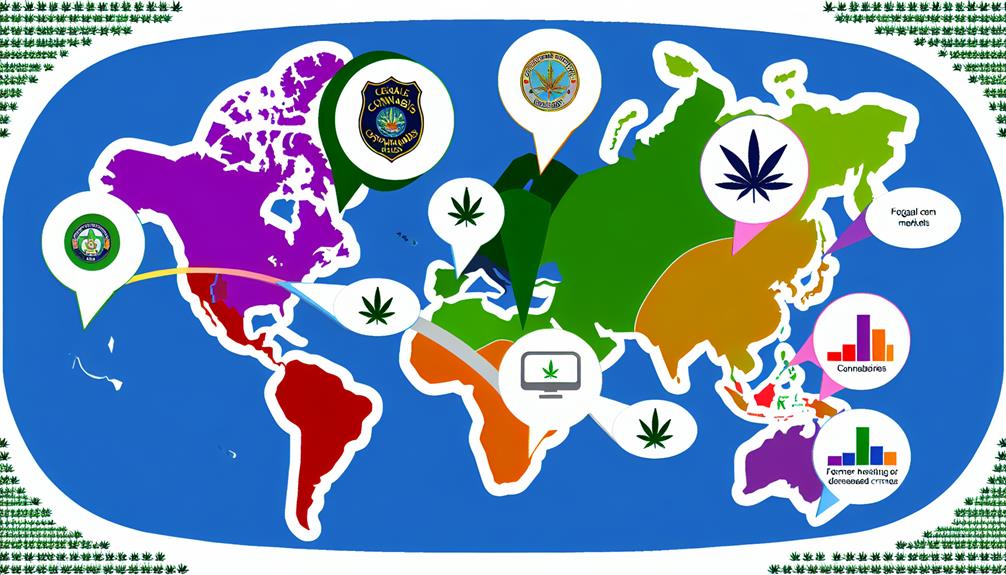Imagine a tangled web where the threads of legal cannabis intertwine with the roots of global crime.
As you navigate through the intricate relationship between the legalization of cannabis and crime rates worldwide, you may uncover surprising insights that challenge conventional wisdom.
From the impact of legalization on criminal activities to the influence of decriminalization on cross-border crimes, the connection between legal cannabis and global crime rates is a complex puzzle waiting to be unraveled.
Table of Contents
How Legal Cannabis Influences Global Crime Rates? Learn From the Expert Guide:
Impact of Legalization on Crime Rates
Legalizing cannabis has shown a significant impact on reducing crime rates in various regions. By legalizing cannabis, law enforcement resources can be redirected towards more serious crimes, leading to a decrease in overall crime rates. With regulated cannabis markets, illegal drug trafficking and associated crimes tend to diminish, as legal sales provide a safer and controlled environment for consumers.
In states like Colorado and Washington in the United States, where cannabis has been legalized, there’s been a noticeable decrease in violent crimes related to the illegal drug trade. The legalization of cannabis disrupts the black market, reducing the incentives for criminal activities such as drug trafficking and related violence. Additionally, legalizing cannabis can lead to a decrease in petty crimes, as individuals no longer need to resort to illegal means to acquire the substance.
RELATED ARTICLE: 3 Best Insights on Marijuana-Induced Cognitive Decline
Influence of Decriminalization on Criminal Activity
Decriminalizing cannabis has been associated with a noticeable reduction in low-level drug-related offenses. By removing criminal penalties for possession of small amounts of marijuana, decriminalization shifts focus away from minor possession charges, reducing the strain on the criminal justice system. This approach aims to prioritize more serious crimes while providing individuals with access to support and resources rather than punishment.
In addition to decreasing low-level drug offenses, decriminalization can lead to a decline in associated criminal activity. When cannabis possession is no longer a criminal offense, the illicit market for marijuana may diminish. With legal avenues available, individuals are less likely to engage in illegal activities to obtain cannabis. This shift can disrupt criminal networks that profit from the illegal sale of marijuana, potentially reducing overall crime rates in communities.
Decriminalization offers a more balanced approach to drug policy, focusing on harm reduction and public health rather than punitive measures. While it may not eliminate all criminal activity, the reduction in low-level drug offenses and associated crimes can contribute to improved community safety and well-being.
Global Trends in Cannabis Legalization and Crime
As cannabis policies evolve globally, the correlation between legalization and crime rates becomes a focal point of analysis. Understanding the global trends in cannabis legalization and crime can provide valuable insights into the impact of changing cannabis policies on criminal activity.
- Varied Legalization Approaches: Different countries have adopted diverse approaches to cannabis legalization, including medical use only, decriminalization, and full legalization.
- Impact on Black Market: Legalization can disrupt illegal cannabis markets, potentially reducing associated criminal activities such as drug trafficking and organized crime.
- Law Enforcement Priorities: Changes in cannabis laws may influence law enforcement strategies, with resources potentially shifting away from cannabis-related offenses to focus on more serious crimes.
- Cross-Border Implications: Legalization in one country can have ripple effects on neighboring nations, impacting drug trafficking routes and transnational criminal organizations.
Understanding these global trends is essential for policymakers and law enforcement agencies as they navigate the complex relationship between cannabis legalization and crime rates.
Connection Between Legal Cannabis and Crime Reduction
You can observe a noticeable decrease in certain types of crime in regions where cannabis has been legalized for recreational use. Studies have shown that in areas where cannabis is legal, there’s a reduction in violent crimes such as homicides, aggravated assaults, and robberies. This decrease in violent crime rates is attributed to factors such as the regulation of the cannabis market, which reduces the involvement of criminal organizations in illegal drug trafficking.
Moreover, the legalization of cannabis can lead to a decrease in property crimes like burglaries and thefts. With legal access to cannabis, individuals are less likely to turn to illegal activities to support their drug habits. Additionally, law enforcement resources can be reallocated to focus on more serious crimes instead of policing cannabis-related activities, leading to an overall decline in crime rates.
Legal Cannabis and Cross-Border Criminal Activities
Legalizing cannabis has the potential to impact cross-border criminal activities due to its effect on the illicit drug trade. With the legalization of cannabis in certain regions, the dynamics of cross-border criminal activities are undergoing significant changes.
- Reduction in Cannabis Smuggling: Legalizing cannabis reduces the demand for illegally imported marijuana, leading to a decrease in cannabis smuggling across borders.
- Shift to Other Illicit Substances: Criminal organizations may shift their focus to trafficking other illicit substances like harder drugs when the profitability of cannabis decreases.
- Money Laundering Challenges: Legal cannabis businesses provide more legitimate avenues for financial transactions, making it harder for criminal groups to launder money across borders.
- Competition for Market Share: Legal cannabis markets create competition for illegal drug suppliers, potentially leading to conflicts and disruptions in cross-border criminal operations.
These factors highlight the intricate relationship between legalizing cannabis and its impact on cross-border criminal activities.
Frequently Asked Questions
How Does the Legalization of Cannabis Impact the Underground Market for Illegal Drugs?
When cannabis is legalized, the underground drug market sees a shift. Legalization can reduce the demand for illegal drugs, impacting the underground market. It may lead to decreased criminal activity and disrupt illegal drug trade networks.
Are There Any Correlations Between Legal Cannabis and Organized Crime Activities in Countries Where It Is Legal?
In countries where cannabis is legal, organized crime activities may shift focus to other illicit operations. However, legalizing cannabis can reduce the influence of criminal organizations in the marijuana market, leading to a decrease in related crimes.
What Measures Are Being Taken by Law Enforcement Agencies to Prevent Illegal Cannabis From Being Trafficked Across Borders in Regions With Differing Legal Statuses?
To prevent illegal cannabis trafficking across borders in regions with differing legal statuses, law enforcement agencies are increasing border patrols, enhancing intelligence sharing, and conducting joint operations to intercept and dismantle smuggling networks.
How Has the Legalization of Cannabis Affected the Rate of Violent Crimes Related to Drug Trafficking and Distribution?
When cannabis is legalized, violent crimes tied to drug trafficking often decrease due to regulated markets. Legalization can disrupt illegal operations, reducing violence associated with black market activities and allowing law enforcement to focus on more serious crimes.
Are There Any Known Cases of Legal Cannabis Businesses Being Used as a Front for Illegal Activities Such as Money Laundering or Human Trafficking?
Yes, there have been instances of legal cannabis businesses being used as fronts for illegal activities. It’s essential to remain vigilant and ensure compliance with regulations to prevent such exploitation in the industry.
Conclusion
Overall, legal cannabis has shown a positive impact on global crime rates.
Decriminalization and legalization have led to a decrease in criminal activity related to cannabis, as well as a reduction in overall crime rates.
Countries that have legalized cannabis have experienced lower levels of violence and illicit drug trade, showcasing the potential for legal cannabis to contribute to a safer and more regulated society.


